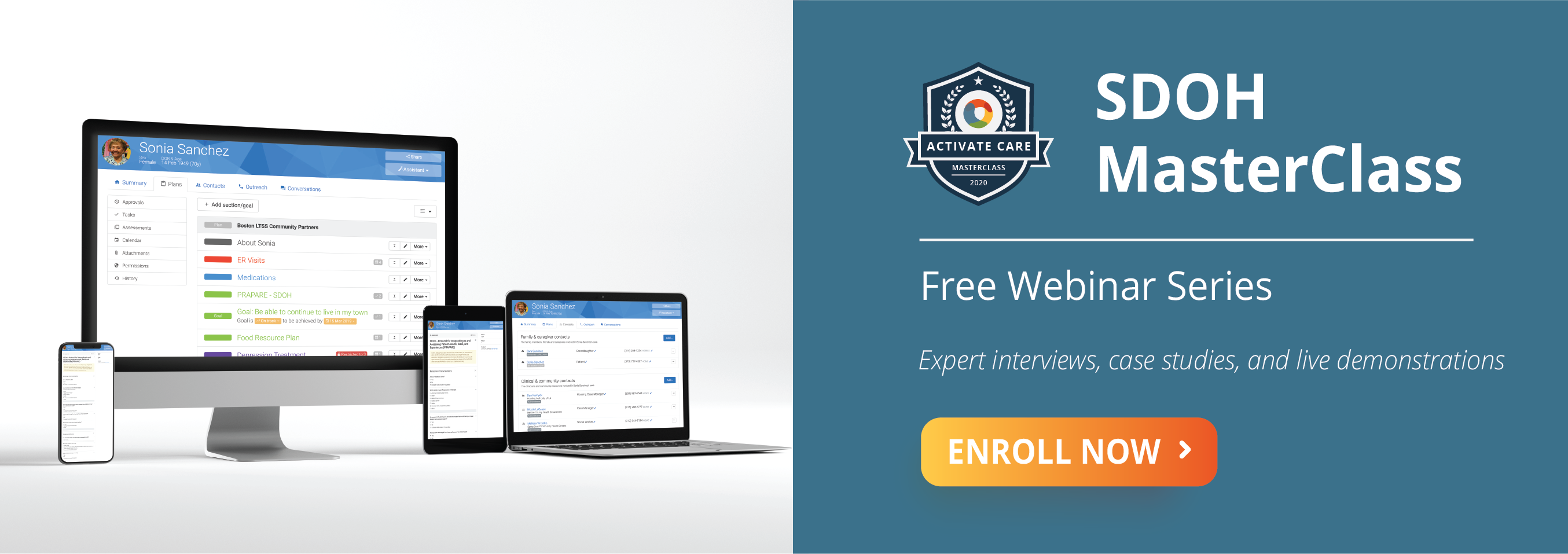In the midst of the COVID-19 pandemic, many social services organizations and human services agencies are closing their offices and providing services in other ways, such as online and over the telephone. Telehealth usage by social service providers has skyrocketed. If you lead a social services organization, or work at one, then you know that virtual care can be a cost-effective means of meeting needs for the people you serve.
Given the speed with which you are forced to implement these services, you may encounter some challenges along the way. We would like to share some of what we have learned about using virtual care technologies and offer our support during and after this public health crisis.
What is telehealth?
According to the American Telemedicine Association, telehealth is the remote delivery of health care using telephones, smartphones, and mobile wireless devices with or without a video connection. The term “telehealth” is often used in ways that are broader in scope than telemedicine, covering remote, clinical healthcare services as well as non-clinical services, such as social services. The term “telemedicine” more often refers solely to remote clinical services.
Dr. Michael Fratkin is the founder of ResolutionCare, a social enterprise offering remote palliative care services via videoconferencing technology. He explained to the Center to Advance Palliative Care that, in his mind, delivering care via “video conferencing is not just a different mechanism for the same encounter,” but rather “a unique and exciting new context for you to offer value and service.”
Utilizing technology like Skype, Zoom, and FaceTime for services can be a really helpful way for your team to continue making progress with individuals and keeping engagement strong. Before you do offer any services using these tools, risk advisory firm Horton advises that “agencies must converse with their insurance broker to make sure that the correct coverage is in place should a claim arise.”
How should you pick a telehealth platform?
As a first step in adopting a telehealth platform that will work for virtual case management, ASPE (the Office of the Assistant Secretary for Planning and Evaluation) at the Department of Health and Human Services has laid out a number of technology and practice considerations:
- Infrastructure: For human services agencies to determine which technology is most appropriate for their own needs, they should consider the IT infrastructure of the provider, privacy restrictions, complexity of information to be communicated, caseworker experience, as well as technological limitations of clients, such as limited access to the internet.
- Videoconferencing: For many types of services - such as child welfare - telephone communication may be insufficient to gauge safety or other aspects of family well being, or to offer and understand interpersonal cues, requiring more sophisticated technology such as videoconferencing.
- Bandwidth: Telehealth may tax existing telephone systems, and human services agencies may need to increase capacity to meet new demand. Both human service agencies and clients must have devices and access to the Internet, preferably high-speed broadband connections for video conferencing, and/or smart phones or tablets that allow for calls using video platforms
- Ease of Use: Human service agencies and clients must be trained on how to use these new systems, from both a technological and a practice standpoint. Training caseworkers means more than training them to use technology. Working effectively with clients by virtual means can be challenging and may require training in different practice methods since interacting with clients over telephone or video often requires different communication methods than in-person contact.
- Data Sharing: Human services agencies often deal with personally identifiable information about clients that may be protected by federal or state privacy rules. In addition, in areas such as domestic violence or child protection, privacy considerations are critical, including privacy of communication in the home. Some agencies are HIPAA covered entities or may be covered by the regulations on substance use disorder treatment records in 42 CFR Part 2.
- Security: Even when not facing health-related privacy restrictions, human services agencies should enable all available encryption and privacy modes when using communication applications.
- Consent: Human services agencies should also notify clients that third-party remote communication technologies may introduce privacy risks. Human service agencies should ensure that clients verbally consent to virtual case management and should provide notice that data charges may apply from their cellular or internet service provider.
Activate Care Helps Social Services with Telehealth
Quickly, Efficiently, and Cost-Effectively
Since 2013, we have worked with hundreds of healthcare and social services organizations across the country. In response to the pandemic, we are committed to doing everything we can to help combat the effects of this virus and save lives, so we are making our software free for you to use. In line with the above guidance from HHS, our COVID-19 Response Platform offers you:
- Easy-to-use virtual case management tools that can be set up for you within just a few hours, with your team trained to use them in under 10 minutes.
- Fully HIPAA-compliant with CFR Part 2 capabilities for secure data management, consent tracking, and smart access level and permissions.
- Embedded and HIPAA-compliant telehealth with Zoom® for all virtual visits, group meetings, and telehealth sessions.
We have a dedicated team of 30+ professionals standing by to help you. To get started with your free COVID-19 Response Platform, join us here.
